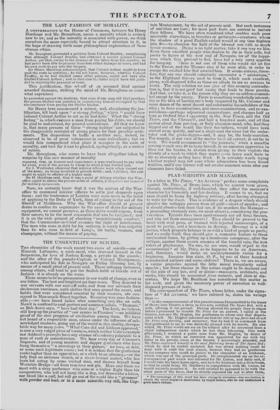THE LAST FASHION OF MORALITY.
A CONVERSATION in the House of Commons, between Sir Henry Hardinge and Mr. Brougham, opens a morality which is entirely new to us ; and as the morality is associated with power, we think ourselves the more especially bound to attract attention to it, in the hope of drawing forth some philosophical explanation of these strange ethics.
Mr. Brougham presented a petition from Colonel Bradley, complaining that although Colonel Bradley had obtained a verdict against Colonel Arthur, yet that, owing to the absence of the latter from the country, he had never been able to procure from him either damages or costs, and had his own costs to pay into the bargain. Sir Henry Hardinge acknowledged, that Colonel Arthur ought to have paid the costs in question ; he did not know, however, whether Colonel Bradley, as he had libelled many other persons, might not have also libelled Colonel Arthur ; and in that case tL latter might have felt justi- fied in resisting the payment of costs.
This justification, this set-off of an assumed libel against awarded damages, striking the mind of Mr. Brougham as some- what capricious
he protested against the doctrine, that even if one man did libel another, the person libelled was justified in considering himself exempted by that circumstance from paying the libeller his due.
Sir Henry here commenced a retreat, and, abandoning the jus- tification, fell back upon " a strong feeling," which " might have induced Colonel Arthur to act as he had done." What the "strong feeling" is, which excuses a man from paying his debts, we should be glad to understand, for general convenience. All that we know is, that many persons of these "strong feelings" are subjected to the disagreeable restraint of strong places for their peculiar senti- ments. The disposition to baffle a creditor may, indeed, be observed to be of great vehemence in some individuals ; but we would fain comprehend what place it occupies in the code of morality, and how far it can be pleaded, apologetically, as a motive of action.
Mr. Brougham, who seems to have been altogether taken by surprise by this new manner of morality
repeated, that, in honour and conscience, a man was bound to pay what he owed, even if the person to whom he owed it had libelled him. Sir J. Wrottesley observed that inferior officers were often turned out of the army, on being involved in private debts ; and, a fortiori, the rule ought to apply to officers of a higher rank. Sir H. Hardinge said, that it was a point of delicacy whether the War- office ought to notice the private debts of officer; if they were not incurred for military equipments.
Now, we certainly know that it was the custom of the War- office to command inferior officers to settle just demands upon them ; and the tradesmen of London were even more in the habit of applying to the Duke of York, than of calling in the aid of the Sheriff of Middlesex. Why the War-office should at present desire to confine its cognizance to the cases of debts for military equipment, we cannot perceive, as those debts would appear, from their nature, to be the most excusable that can be imagined; and it is on the wide ground of checking "ungentlemanly conduct," that the Commander-in-Chief assumes the right of interference. The man who runs in debt for his uniform, is surely less culpable than he who runs in debt at Long's, for turtle, venison, and champagne, without the means of paying. •
























 Previous page
Previous page